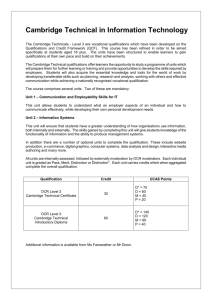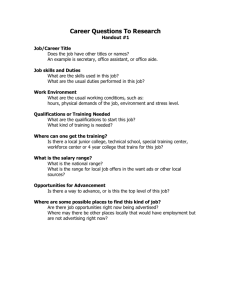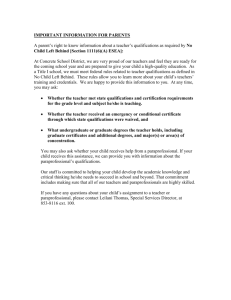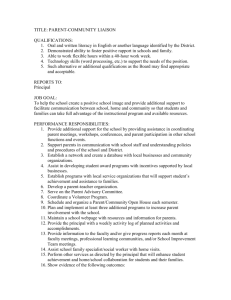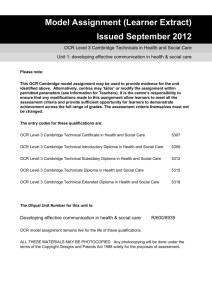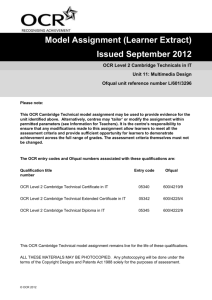OCR Cambridge Technicals LEVEL 3 Art & Design – Fashion
advertisement
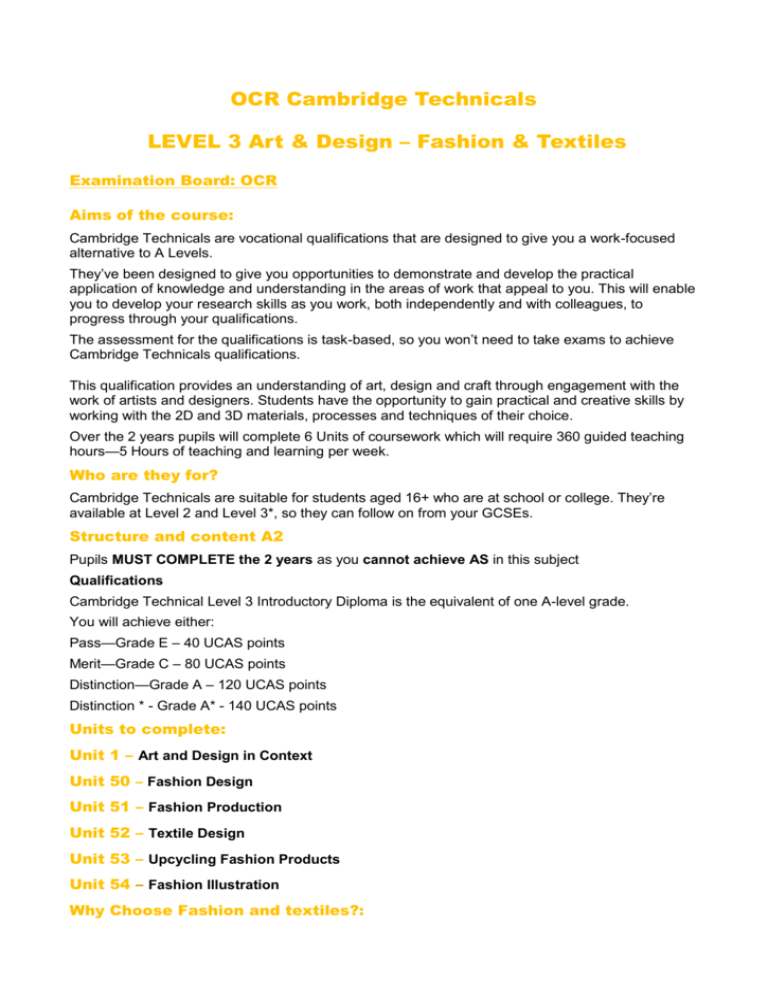
OCR Cambridge Technicals LEVEL 3 Art & Design – Fashion & Textiles Examination Board: OCR Aims of the course: Cambridge Technicals are vocational qualifications that are designed to give you a work-focused alternative to A Levels. They’ve been designed to give you opportunities to demonstrate and develop the practical application of knowledge and understanding in the areas of work that appeal to you. This will enable you to develop your research skills as you work, both independently and with colleagues, to progress through your qualifications. The assessment for the qualifications is task-based, so you won’t need to take exams to achieve Cambridge Technicals qualifications. This qualification provides an understanding of art, design and craft through engagement with the work of artists and designers. Students have the opportunity to gain practical and creative skills by working with the 2D and 3D materials, processes and techniques of their choice. Over the 2 years pupils will complete 6 Units of coursework which will require 360 guided teaching hours—5 Hours of teaching and learning per week. Who are they for? Cambridge Technicals are suitable for students aged 16+ who are at school or college. They’re available at Level 2 and Level 3*, so they can follow on from your GCSEs. Structure and content A2 Pupils MUST COMPLETE the 2 years as you cannot achieve AS in this subject Qualifications Cambridge Technical Level 3 Introductory Diploma is the equivalent of one A-level grade. You will achieve either: Pass—Grade E – 40 UCAS points Merit—Grade C – 80 UCAS points Distinction—Grade A – 120 UCAS points Distinction * - Grade A* - 140 UCAS points Units to complete: Unit 1 – Art and Design in Context Unit 50 – Fashion Design Unit 51 – Fashion Production Unit 52 – Textile Design Unit 53 – Upcycling Fashion Products Unit 54 – Fashion Illustration Why Choose Fashion and textiles?: If you prefer to learn in a way that’s practical and work-related, then Cambridge Technicals are ideal. The great thing about them is that they keep your options open – so if you’re not fully convinced that a vocational way of learning is right for you, Cambridge Technicals keep the door open for a move to higher education further down the line. What progression opportunities do Cambridge Technicals provide? The great thing about them is that they still give you a choice of opportunities once you’ve completed them. The three choices open to you are: Employment, where you can put your new practical skills towards generating an income Further education, such as a higher-level qualification at school or college Higher education, such as a degree course at university. Access to higher education is possible if you take the Level 3 qualifications because they have UCAS points. Assessment Assessment is in line with OCR assessment procedure. All units will be centrally assessed and then externally moderated by OCR. There are no timetabled exams for this qualification; candidates may complete units at a time that suits the centre. The full award and units from this qualification are graded as Pass, Merit, Distinction or Distinction * which equate to and E, C, A and A* at A-Level. Entry Requirements Grade C at GCSE Textiles is essential. Grade C at GCSE Art is desirable. Food Science and Nutrition Level 3 Diploma WJEC Advantages to learners Develop both practical and academic skills through applied learning Flexible choices – students can specialise in individual areas of interest to them Assessed through a combination of written examination, projects and case studies to cater for different learning styles. Structure of units Learners must complete 3 units. Two mandatory and one optional. 1 Meeting Nutritional Needs of Specific Groups Assessment guided learning hours Internal and 180 External 2 Ensuring Food is Safe to Eat External 90 3 Experimenting to Solve Food Production Internal 90 Internal 90 Problems 4 Current Issues in Food Science and Nutrition Why study? Level 3 Food Science and Nutrition qualifications allow students to gain a wealth of knowledge about the food and nutrition industry. Students will have the opportunity to learn about the relationship between the human body from food aswell as practical skills for cooking and preparing food. Students will be able to consider employment in a range of different industries including the food and drink sectors of hospitality, catering, food production and food retail. Plan, Do, Review This qualification has been designed around the concept of a ‘plan, do, review’ approach to learning. There is a strong emphasis on practical work, making this an ideal choice for students who prefer learning through doing. The qualifications mirror many work activities in the food and nutrition industry and facilitates learning in a range of contexts. Students are able to apply and extend their learning outside the confines of the classroom.

